大学英语导论课 第一节课
- 格式:ppt
- 大小:8.08 MB
- 文档页数:21
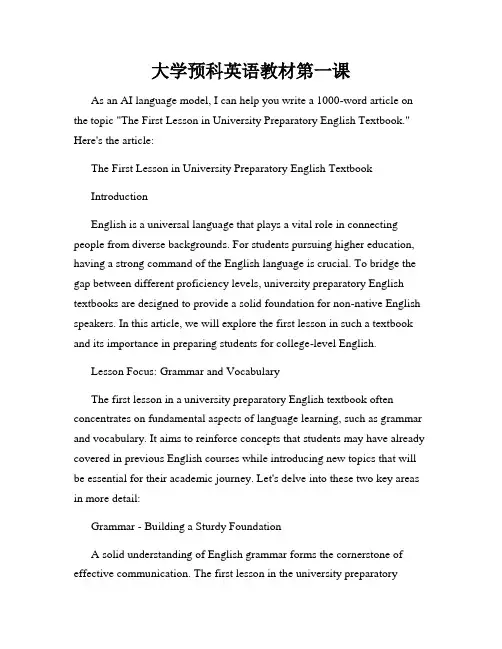
大学预科英语教材第一课As an AI language model, I can help you write a 1000-word article on the topic "The First Lesson in University Preparatory English Textbook." Here's the article:The First Lesson in University Preparatory English TextbookIntroductionEnglish is a universal language that plays a vital role in connecting people from diverse backgrounds. For students pursuing higher education, having a strong command of the English language is crucial. To bridge the gap between different proficiency levels, university preparatory English textbooks are designed to provide a solid foundation for non-native English speakers. In this article, we will explore the first lesson in such a textbook and its importance in preparing students for college-level English.Lesson Focus: Grammar and VocabularyThe first lesson in a university preparatory English textbook often concentrates on fundamental aspects of language learning, such as grammar and vocabulary. It aims to reinforce concepts that students may have already covered in previous English courses while introducing new topics that will be essential for their academic journey. Let's delve into these two key areas in more detail:Grammar - Building a Sturdy FoundationA solid understanding of English grammar forms the cornerstone of effective communication. The first lesson in the university preparatoryEnglish textbook dedicates ample time to reviewing and expanding students' knowledge of grammar rules. It may cover topics like verb tenses, sentence structures, agreement, and the correct usage of articles. Reinforcing these foundational concepts helps students communicate their ideas accurately and confidently in both written and spoken English.Vocabulary - Expanding the LexiconGrowing one's vocabulary is vital for expressing ideas precisely and conveying intended meanings. The first lesson also focuses on expanding students' vocabulary by introducing relevant words, idiomatic expressions, and collocations. This enhances their ability to interpret and produce nuanced English expressions. Building a strong vocabulary equips students with the necessary tools to excel in their coursework and future academic endeavors.Lesson Activities: Interactive LearningTo ensure active engagement and effective learning, the first lesson in a university preparatory English textbook incorporates various interactive activities:1. Pair and Group Discussions: Students engage in conversations based on prompts related to the lesson's grammar and vocabulary topics. This encourages collaborative learning, boosts confidence, and sharpens their speaking skills.2. Reading Comprehension: Texts tailored specifically for the preparatory level provide students with the opportunity to practice their reading skills while reinforcing grammar and vocabulary.3. Writing Practice: Students complete writing exercises focusing on sentence formation, paragraph development, and the incorporation of newly acquired vocabulary. This allows them to refine their writing abilities and enhances their overall language proficiency.4. Listening Exercises: Listening tasks, such as audio recordings or videos, are included to improve students' listening skills and expose them to authentic English accents and speech patterns.ConclusionThe first lesson in a university preparatory English textbook serves as the gateway to mastering the language skills required in higher education. By diligently attending to grammar and vocabulary, students can establish a sturdy foundation for their English language journey. Through interactive activities, they develop essential skills in speaking, listening, reading, and writing. By prioritizing these fundamental areas, the first lesson sets the stage for students to confidently navigate future college-level courses. As they progress, students will build upon this knowledge, ultimately becoming proficient English users ready to embrace academic success.Please note that this article is a mock response and the content may not accurately reflect an actual university preparatory English textbook.。

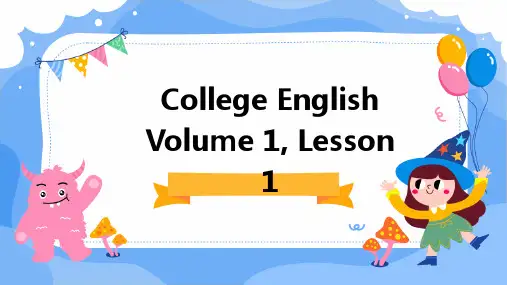
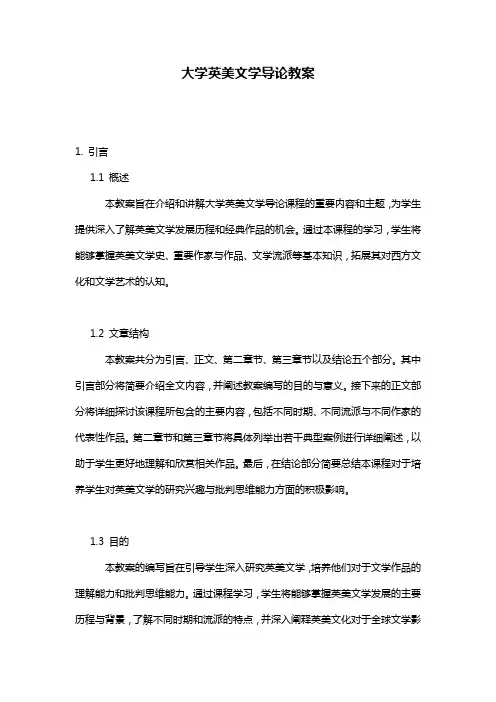
大学英美文学导论教案1. 引言1.1 概述本教案旨在介绍和讲解大学英美文学导论课程的重要内容和主题,为学生提供深入了解英美文学发展历程和经典作品的机会。
通过本课程的学习,学生将能够掌握英美文学史、重要作家与作品、文学流派等基本知识,拓展其对西方文化和文学艺术的认知。
1.2 文章结构本教案共分为引言、正文、第二章节、第三章节以及结论五个部分。
其中引言部分将简要介绍全文内容,并阐述教案编写的目的与意义。
接下来的正文部分将详细探讨该课程所包含的主要内容,包括不同时期、不同流派与不同作家的代表性作品。
第二章节和第三章节将具体列举出若干典型案例进行详细阐述,以助于学生更好地理解和欣赏相关作品。
最后,在结论部分简要总结本课程对于培养学生对英美文学的研究兴趣与批判思维能力方面的积极影响。
1.3 目的本教案的编写旨在引导学生深入研究英美文学,培养他们对于文学作品的理解能力和批判思维能力。
通过课程学习,学生将能够掌握英美文学发展的主要历程与背景,了解不同时期和流派的特点,并深入阐释英美文化对于全球文学影响的重要性。
同时,通过对经典作家与作品的研究,学生将拓展自己的文化视野,丰富自身人文素养。
此外,本课程还将培养学生的批判性思维和分析能力,使他们具备对文学作品进行评价和解读的能力。
以上是“1. 引言”部分内容,请根据需要进一步添加补充相关内容。
2. 正文在这一部分中,我们将介绍大学英美文学导论的具体内容和教学方法。
本课程旨在让学生对英美文学的发展历程、作家及其作品有一个整体的认识,并培养学生对文学作品的批判性思维和分析能力。
2.1 课程背景大学英美文学导论是一门重要的人文科学课程,旨在提供对英美文学经典作品及其背后的历史、社会背景、流派等方面进行深入了解和分析的机会。
通过对经典作品的研究,我们可以更好地理解人类文化与价值观念的演变过程。
2.2 教学目标在这门课上,我们将追求以下教育目标:a) 了解英美文学的发展历程及其主要特点;b) 分析并理解不同时期、不同流派及其代表性作品;c) 培养阅读和批判性思考能力;d) 培养写作和表达能力;e) 培养跨文化交流与合作意识。
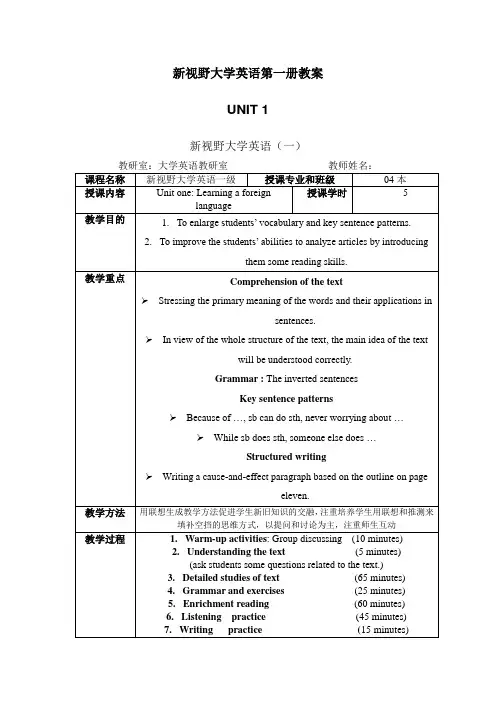
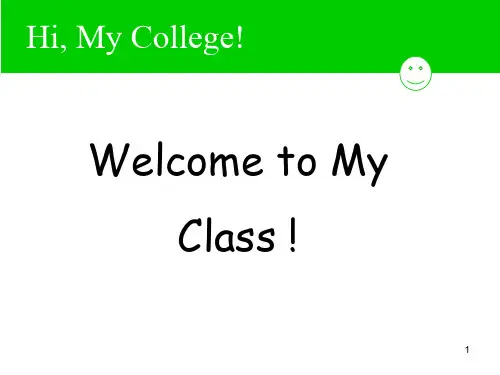
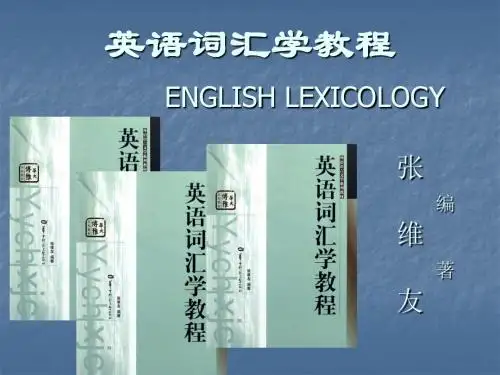
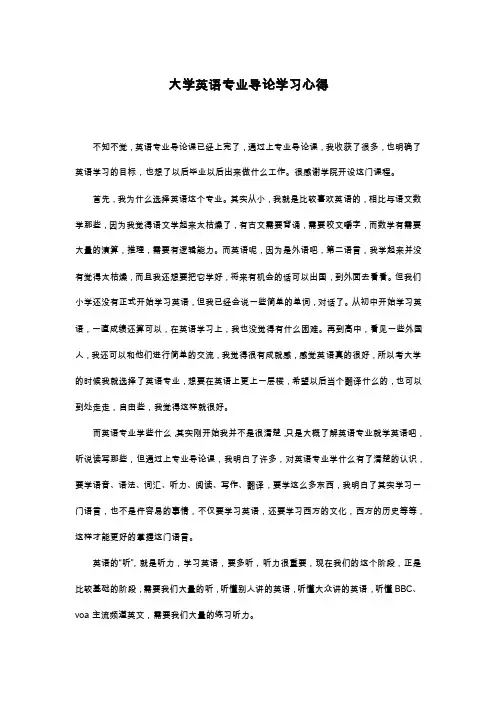
大学英语专业导论学习心得不知不觉,英语专业导论课已经上完了,通过上专业导论课,我收获了很多,也明确了英语学习的目标,也想了以后毕业以后出来做什么工作。
很感谢学院开设这门课程。
首先,我为什么选择英语这个专业。
其实从小,我就是比较喜欢英语的,相比与语文数学那些,因为我觉得语文学起来太枯燥了,有古文需要背诵,需要咬文嚼字,而数学有需要大量的演算,推理,需要有逻辑能力。
而英语呢,因为是外语吧,第二语言,我学起来并没有觉得太枯燥,而且我还想要把它学好,将来有机会的话可以出国,到外面去看看。
但我们小学还没有正式开始学习英语,但我已经会说一些简单的单词,对话了。
从初中开始学习英语,一直成绩还算可以,在英语学习上,我也没觉得有什么困难。
再到高中,看见一些外国人,我还可以和他们进行简单的交流,我觉得很有成就感,感觉英语真的很好,所以考大学的时候我就选择了英语专业,想要在英语上更上一层楼,希望以后当个翻译什么的,也可以到处走走,自由些,我觉得这样就很好。
而英语专业学些什么,其实刚开始我并不是很清楚,只是大概了解英语专业就学英语吧,听说读写那些,但通过上专业导论课,我明白了许多,对英语专业学什么有了清楚的认识,要学语音、语法、词汇、听力、阅读、写作、翻译,要学这么多东西,我明白了其实学习一门语言,也不是件容易的事情,不仅要学习英语,还要学习西方的文化,西方的历史等等,这样才能更好的掌握这门语言。
英语的“听”,就是听力,学习英语,要多听,听力很重要,现在我们的这个阶段,正是比较基础的阶段,需要我们大量的听,听懂别人讲的英语,听懂大众讲的英语,听懂BBC、voa主流频道英文,需要我们大量的练习听力。
英语的“说”,也很重要,一门语言就是用来交流的工具,只有说出来,这门语言才会得到运用,但现在,一些人学的是哑巴英语,学习英语更要学会怎么去说出来。
说的时候,也要注意语音,发音准确,让别人听懂和理解,这样英语才算学好了的。
英语的“读”,是要我们广泛的阅读,多读些文学、社会学、心理学、新闻报道的题材,这样才能增加我们的见识,开阔我们的眼界,学习英语,不仅仅只学习这门语言,多个方面都要涉及到,这样才能更好的去掌握它。
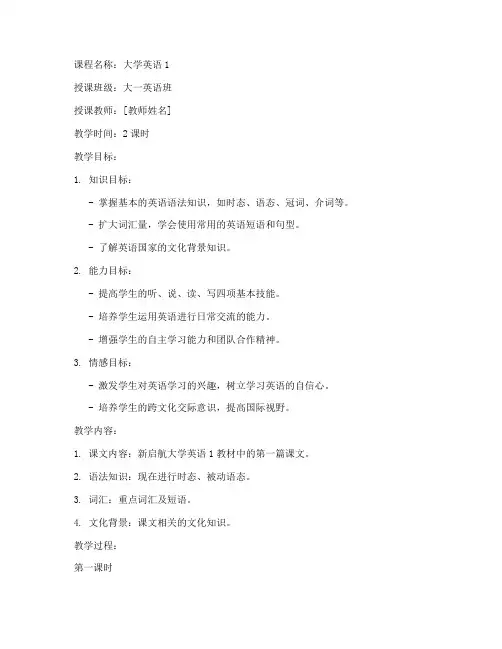
课程名称:大学英语1授课班级:大一英语班授课教师:[教师姓名]教学时间:2课时教学目标:1. 知识目标:- 掌握基本的英语语法知识,如时态、语态、冠词、介词等。
- 扩大词汇量,学会使用常用的英语短语和句型。
- 了解英语国家的文化背景知识。
2. 能力目标:- 提高学生的听、说、读、写四项基本技能。
- 培养学生运用英语进行日常交流的能力。
- 增强学生的自主学习能力和团队合作精神。
3. 情感目标:- 激发学生对英语学习的兴趣,树立学习英语的自信心。
- 培养学生的跨文化交际意识,提高国际视野。
教学内容:1. 课文内容:新启航大学英语1教材中的第一篇课文。
2. 语法知识:现在进行时态、被动语态。
3. 词汇:重点词汇及短语。
4. 文化背景:课文相关的文化知识。
教学过程:第一课时一、导入1. 利用多媒体展示英语国家的图片,激发学生的学习兴趣。
2. 提问:同学们对英语国家有哪些了解?为什么学习英语?二、新课导入1. 介绍课文背景,引导学生了解文章主题。
2. 预习课文,让学生圈出不懂的单词和短语。
三、课文讲解1. 分析课文结构,讲解文章大意。
2. 逐句翻译课文,讲解重点词汇和短语。
3. 分析课文中的语法知识,如现在进行时态、被动语态等。
四、课堂练习1. 完成课后练习题,巩固所学知识。
2. 分组讨论课文内容,培养学生的合作精神。
五、总结1. 回顾本节课所学内容,强调重点知识。
2. 布置课后作业,如背诵课文、翻译课文等。
第二课时一、复习导入1. 复习上一节课所学内容,提问学生掌握情况。
2. 回答学生提出的问题,帮助学生巩固知识。
二、词汇讲解1. 列出课文中的重点词汇,讲解其用法和搭配。
2. 通过例句,让学生掌握词汇的用法。
三、语法讲解1. 复习现在进行时态和被动语态的构成。
2. 通过例句,让学生理解语法规则。
四、课堂练习1. 完成课后练习题,巩固所学知识。
2. 模拟对话,让学生运用所学知识进行交流。
五、总结1. 回顾本节课所学内容,强调重点知识。
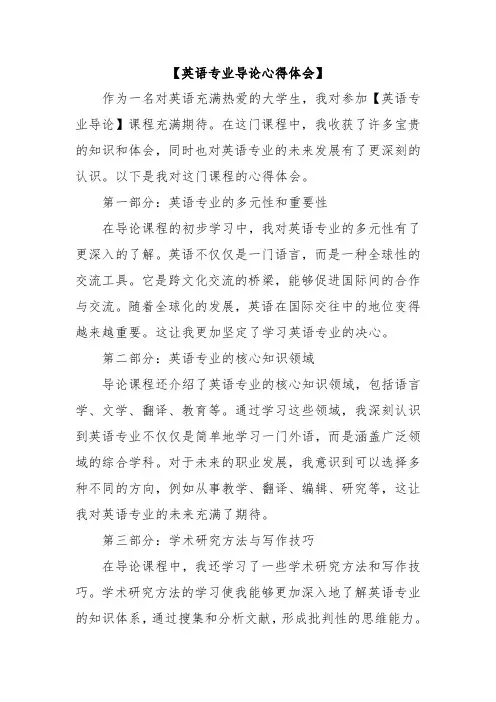
【英语专业导论心得体会】作为一名对英语充满热爱的大学生,我对参加【英语专业导论】课程充满期待。
在这门课程中,我收获了许多宝贵的知识和体会,同时也对英语专业的未来发展有了更深刻的认识。
以下是我对这门课程的心得体会。
第一部分:英语专业的多元性和重要性在导论课程的初步学习中,我对英语专业的多元性有了更深入的了解。
英语不仅仅是一门语言,而是一种全球性的交流工具。
它是跨文化交流的桥梁,能够促进国际间的合作与交流。
随着全球化的发展,英语在国际交往中的地位变得越来越重要。
这让我更加坚定了学习英语专业的决心。
第二部分:英语专业的核心知识领域导论课程还介绍了英语专业的核心知识领域,包括语言学、文学、翻译、教育等。
通过学习这些领域,我深刻认识到英语专业不仅仅是简单地学习一门外语,而是涵盖广泛领域的综合学科。
对于未来的职业发展,我意识到可以选择多种不同的方向,例如从事教学、翻译、编辑、研究等,这让我对英语专业的未来充满了期待。
第三部分:学术研究方法与写作技巧在导论课程中,我还学习了一些学术研究方法和写作技巧。
学术研究方法的学习使我能够更加深入地了解英语专业的知识体系,通过搜集和分析文献,形成批判性的思维能力。
写作技巧的学习则有助于我提高学术论文和报告的写作能力,这对于日后的学习和工作都非常重要。
第四部分:培养综合能力与扩展国际视野导论课程不仅仅是对英语专业知识的介绍,更重要的是培养我们的综合能力和拓宽国际视野。
通过参加小组讨论、学术报告和文化交流活动,我学会了团队合作、沟通技巧以及跨文化交际的能力。
这些能力将在未来的学习和职业发展中起到重要的作用。
第五部分:持续学习与发展通过【英语专业导论】这门课程,我深深认识到学习是一个持续不断的过程。
英语专业是一个充满挑战和机遇的领域,要保持学习的热情和求知欲,不断拓展自己的知识面,紧跟行业的发展动态。
我决心将英语专业作为我的主修专业,并不断努力提高自己的英语水平和专业能力,争取在未来的职业生涯中取得更好的发展。
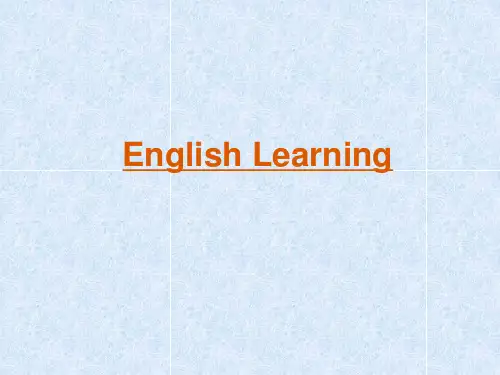
《大学英语一》开篇导学同学们:你们好,欢迎大家参加《大学英语一》这门课程的学习,很高兴这个学期能和大家一起互相交流,互相学习,共同把《大学英语一》这门基础课程学好,为进一步深入学习英语打下坚实的基础。
大家一定很想了解《大学英语一》是怎样一门课,它的教学目标和基本任务是什么,成绩如何计量,如何才能学好这些知识,有那些可利用的网络辅导资源。
下面就这些问题给大家做一概述。
一、教学目标、基本任务和要求明确本课程的教学目标、基本任务和要求,是学好本课程的前提。
本册书为《大学英语》精读教程第一册。
学生在学习本册之前应该已经掌握英语的基本语音和语法知识及1,600个英语单词,并在读、听、写、说等方面受过初步的训练。
本课程旨在继续进行听、说、读、写、译的语言技能训练的同时,加强学生的阅读和写作的训练;在丰富学生综合文化背景知识、提高他们的逻辑思维能力与分析理解能力,为以后的学习打好基础。
基本要求:要求学生了解与课文有关的背景知识及一些特殊的语言现象;掌握大纲要求的词汇,语法等知识点,特别是要熟悉现代英语中的主要构词法,熟练掌握一些常用的前缀、后缀以扩大词汇量。
同时还要掌握一些英语常用的句型,以提高表达能力。
还要求学生领会课文的主旨;并能针对某些内容发表自己的看法。
重点与难点:我们的重点放在培养学生的阅读能力上,也兼顾写和说的能力的培养。
二、课程介绍本册书共有十个单元,供一个学期使用。
每一单元由课文(Text)、生词(New Words)、注释(Notes)、练习(Study &Practice)、阅读练习(Reading Activity)和有引导的写作(Guided Writing)六部分组成。
课文全部选用原文材料,但有少量删改。
选材力求题材、体裁多样,内容丰富有趣,并有一定的启发性。
学生在学习课文时应从全篇内容着眼,并对一些常用词和词组的用法进行分析,既要防止只学习语言点而忽略通篇内容,也要避免只注意文章内容而不重视语言基础的培养。
大学英语开学第一课自我介绍课程介绍课件全文共3篇示例,供读者参考篇1Title: Self-introduction and Course Introduction for the First Class of College EnglishGood morning, everyone. Welcome to the first class of College English. I am [Your Name], your instructor for this course. Today, I would like to begin by introducing myself and providing an overview of what we can expect from this course.First, let me introduce myself. I have a Bachelor's degree in English Literature and a Master's degree in TESOL (Teaching English to Speakers of Other Languages). I have been teaching English to college students for over 5 years and I am excited to be your instructor for this semester.In this course, we will focus on improving your English language skills in four key areas: listening, speaking, reading, and writing. We will also explore various aspects of English language and culture, including vocabulary, grammar, idioms, and literature. Throughout the semester, we will engage in a wide range of activities to help you practice and improve your Englishskills, such as group discussions, presentations, writing assignments, and language games.I have prepared a course syllabus that outlines the topics we will cover each week, as well as the assignments and assessments you will need to complete. I encourage you to read the syllabus carefully and reach out to me if you have any questions or concerns.I look forward to getting to know each of you better and helping you achieve your English language learning goals. Let's work together to make this a successful and enjoyable semester. Thank you.篇2Good morning everyone, my name is Alice and I will be your instructor for the first class of the semester, the Self-Introduction course. I am thrilled to have the opportunity to get to know each and every one of you throughout this course.Today, we will cover the importance of self-introductions in various contexts, such as professional settings, social gatherings, and academic environments. Being able to effectively introduce yourself is a crucial skill that can leave a lasting impression on others.In this course, we will focus on different aspects ofself-introductions, including body language, tone of voice, and content. We will also discuss strategies for overcoming nervousness and building confidence when introducing yourself to new people.Throughout the semester, you will have the opportunity to practice your self-introduction skills through a variety of activities, such as mock interviews, group presentations, and networking events. By the end of the course, you will have the tools and confidence to introduce yourself confidently and professionally in any situation.I encourage you to actively participate in discussions, ask questions, and seek feedback from your classmates and myself. Remember, the more you practice, the better you will become at self-introductions.I am excited for the journey ahead and look forward to getting to know each of you better. Let's make this semester a memorable and rewarding experience. Thank you.篇3Title: Introducing Myself: The First Lesson of University EnglishIntroduction:Welcome to the first lesson of University English! In this course, we will focus on improving your English language skills through various activities and discussions. But before we dive into the course content, let's start by introducing ourselves to get to know each other better.Self-Introduction:My name is [Your Name] and I will be your instructor for this course. I have a strong passion for teaching and helping students improve their English skills. I have a Bachelor's degree in English Literature and a Master's degree in English Education. I have been teaching English for over five years and I am excited to work with all of you.Course Overview:In this course, we will cover a wide range of topics including grammar, vocabulary, reading, writing, listening, and speaking. Each lesson will be interactive and engaging to keep you motivated and interested in learning. We will also incorporate real-life situations and examples to help you apply what you learn in class to the real world.Expectations:I expect each of you to come to class prepared, participate actively, and complete all assignments on time. I encourage you to ask questions, seek clarification, and engage in discussions with your classmates to enhance your learning experience. Remember, practice makes perfect, so don't be afraid to make mistakes and learn from them.Conclusion:I am looking forward to getting to know all of you throughout this semester and helping you improve your English language skills. Let's work together to make this course a successful and enjoyable experience for everyone. Remember, the journey of a thousand miles begins with a single step. Let's take that first step together and make this semester a memorable one. Thank you and let's have a great lesson![End of the document]。